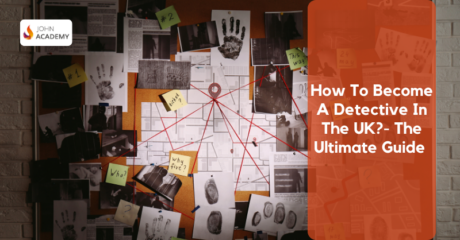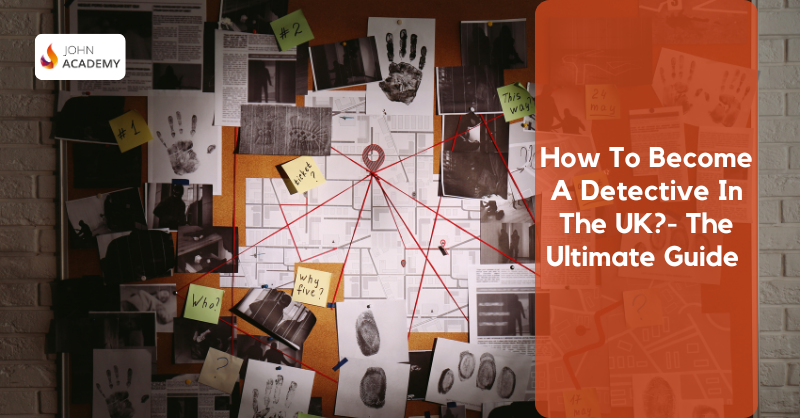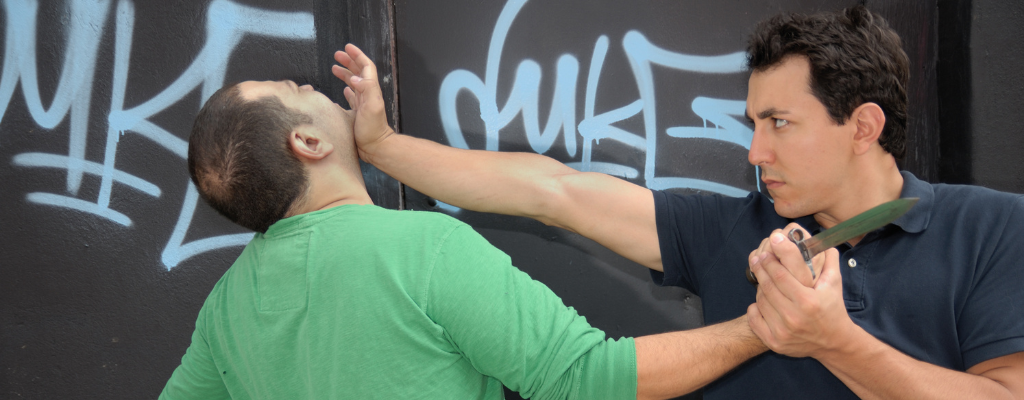

Are you fascinated by intricate mysteries? Do you have a natural talent for solving complex puzzles? Do you have a keen eye for detail and love adventure? If so, becoming a detective could be your calling. But how do you become a detective in the UK? Worry not—our blog is here to help you out. It will give you all the necessary details you need to become the next Sherlock!
Table of Contents
Who is a Detective?
A detective is someone who investigates criminal cases. They identify the real culprit and assist law enforcement in capturing the criminal. In the process of investigation, a detective uses different methods and techniques to dig out the truth. Interviewing witnesses or suspects, conducting surveillance, and analysing information are the key methods used by detectives.
There are two types of detectives: police detectives and private detectives. Their core responsibilities are the same: investigating and solving crimes. However, there are some differences as well.
Private Detective
Private detectives do not work for the government. They are either self-employed or work for agencies. Organisations or individuals usually hire private detectives to investigate crimes. Private investigators do not hold any legal power. Therefore, they can only investigate but do not have the authority to arrest anyone.
In addition, private detectives can choose their clients and the cases they want to work on. As a result, they are accountable to their clients and responsible for reporting to them. Working individually or under agencies means there are limitations on resources. They cannot access all the government databases or get forensic support.
Police Detective
Police detectives work within the framework of the police department, and cases are assigned to them. Unlike the other police officers, the detective does not wear a uniform. Along with the investigation, police detectives have the authority to arrest criminals.
The superior assigns their cases; hence, police detectives report to their superiors. Therefore, the police detectives are accountable to their senior officers and the police department. In addition, police detectives have better resources compared to private detectives. For example, unlimited access to forensic labs, laboratory support, databases, etc.

What are the Responsibilities of a Detective?
As a detective, you have many multifaceted and dynamic roles to play. Here is a list of the major responsibilities you have to fulfil.
- Visiting the crime scene to gather information and evidence related to the crime.
- Gathering, verifying and assessing all the available information about the crime.
- Interviewing witnesses and interrogating the suspects to collect information about the criminal activities.
- Decoding data to identify patterns and motives of the crime to find out potential leads.
- Conducting surveillance and undercover operations to monitor the suspects and gather information and evidence
- Collaborating with other departments and agencies. For example, courts, schools, educational bodies, social workers, etc.
- Presenting evidence and testifying in court.
- Documenting all the evidence and findings from the investigation.
- Developing detailed reports and case summaries for supervisors or higher authorities.
How to Become a Detective in the UK?
As you already know, there are differences between police detectives and private detectives. Now, it’s time to learn how to start your career in either of these categories.
How to Become a Private Detective?
Here are the major steps you need to complete to start practising as a private investigator in the UK.
Education
In order to become a detective in the UK, you will need at least a level 3 qualification, such as A-levels or equivalent. However, a degree in related subjects like criminology, criminal justice, forensic science, etc., will benefit your career. There are also online courses available on different topics.
You can take these online courses and receive a better understanding of related subjects. You can check out the Forensic Science And Criminology Diploma by John Academy. It is an excellent opportunity to enhance your forensic science and criminology knowledge.
Self-defence Training
While working on cases, you may be in dangerous situations with no one around to help you. Police detectives may have a backup, but a private investigator is on their own. So, self-defence training is essential for a private detective. There are different types of self-defence methods. For example, karate, martial arts, hand-to-hand combat etc. You can choose your method according to your physical abilities and interests.
Investigator Licence
Obtaining an investigator licence is not mandatory in the UK. However, a licence can help you in your career progression. It will help you build trust among your clients and also increase the possibility of getting hired by agencies. Like most of the PI in the UK, you can get your licence from Security Industry Authority (SIA). This licence will also allow you to become a part of different associations. You can engage with other investigators and expand your networks through these associations.
Driving Licence
Visiting crime science, meeting with witnesses, chasing suspects, and doing other detective work will require you to travel a lot. So, you need to have a driving licence. You will spend a good amount of time in your car, so make sure your licence and other paperwork are on track.

Work Experience
Experience is a key component in the world of investigation. Without any prior knowledge or first-hand experience, you cannot work on your own. Therefore, you must take an apprenticeship under a professional investigator. Assisting a seasoned professional will help you get a real-life understanding of the job. You will know what to expect on the field and overcome the continuous surge of challenges.
Become a Private Investigator
Once you have gathered a good amount of experience, it’s time to get started. There are many investigation agencies that specialise in different types of investigations. You can choose your area of interest and start your career through these agencies. However, if you want, you can also be self-employed and run your own company.
How to Become a Police Detective?
If you want to work in the police force as a detective, you have to follow a few crucial steps. Here they are:
Educational Qualification
There are different routes to becoming a police detective. The first path is becoming a police officer. In that case, you have to fulfil the requirements allocated for police officers in the UK.
However, it is not mandatory to start as a police officer before becoming a detective. You can opt for the Police Now National Detective Programme. To be eligible for this program, you will need an undergraduate degree with a minimum of 2:1 or the UK equivalent. There are also some other requirements, including age, residency, and nationality.
This detective programme is two years long and consists of 12 weeks in the Detective Academy. This programme combines classroom and field training. After six months, you must pass the National Investigators Exam (NIE). This exam is essential to proceed with the programme. After completing, you will earn a graduate diploma in Professional Policing Practice. Then, you can apply to join the police force as a detective.
Some police forces offer Detective Career Pathsways, where they provide in-house training. For this you will have to enrol in the Detective Degree Holder Entry Programme (DHEP). This programme lasts two years. Here, you will get on-the-job training in addition to academic learning. Therefore, you will achieve your Professional Policing Practice graduate diploma. In the meantime, you will receive training as a police officer. For this path, you will need an undergraduate degree or studying in the last year of graduation.
Individuals who do not possess any degree can apply for the Police Constable Degree Apprenticeship. To be eligible for this, you will require 4-5 GCSEs with grades A*- C along with A-levels or equivalent.
Work Experience
Gathering real-life experience can increase your potential for getting hired in the police force. To get a practical understanding of the police work, you can apply to become a police community support officer. In addition, volunteer work with different communities will help you build communication skills. It will also improve your leadership abilities and teamwork skills.
Background Check
A background check will be conducted on the applicants. Therefore, if you have a history of convictions, you must declare it beforehand. Your application will be cancelled if you do not mention or hide your criminal records. Remember, minor offences may not prevent you from joining. However, they will be evaluated during the selection process.
Physical Fitness
Physical fitness is crucial for becoming a police detective. You will have long working hours with a lot of movement, so your body must be able to take the toll. In addition, you have to pass the Job-Related Fitness Test and fulfil the minimum medical standards required for entry. You have to meet the eyesight standard for detectives.
Driving Licence
You will need a full UK manual driving licence for your career as a police detective. It is important that you have a clean driving licence along with good driving skills.
What Skills Do You Need to Become a Detective?
You will need some personal qualities to become a successful detective. These qualities will assist you in investigating crimes and other aspects of detective work as well. But what are these skills? You will find your answers down below.
- Problem-solving
- Critical thinking
- Attention to Detail
- Physical Fitness
- Empathy
- Communication
- Ethics
Problem-Solving
While solving crime, you will come across problems with many folds. Good problem-solving skills will allow you to look at problems from different perspectives. This is an important part of finding the solution. Problem-solving skills will help you ensure all the questions are answered. In addition, you will be able to overcome the new challenges that come along the way.
Critical Thinking
Untangling mysteries and finding the culprit among many suspects demands strong critical thinking abilities. You need to be able to think outside the box and find patterns or inconsistencies. Critical thinking skills will allow you to analyse all situations. Also, it helps to incorporate new information or evidence into the investigation process.
Attention to Detail
The devil is in the details, so you must be able to pay attention to the smallest details. When it comes to unsolved crimes, details can make or break them. By finding a small detail, you can crack the case. This is why the skills to identify and pay attention to each detail are vital for solving cases.
Physical Fitness

As a detective, you have to spend long hours on your feet. It also involves a lot of fieldwork. For example, examining the crime scene, conducting surveillance, chasing suspects and more. That is why it is essential to have good physical fitness. Also, there is a risk of facing safety issues where you must save yourself. Physical fitness and good self-defence skills can save your life in such a situation.
Empathy
Detectives deal with victims who may be going through a difficult time. In this situation, you have to show empathy and build their trust. Showcasing support to the victim helps them negotiate through the investigation process. However, getting too emotional can also impact the investigation process. Therefore, you must know how to balance your emotions.
Communication
From interviewing witnesses to interrogating suspects. As a detective, you will interact with different groups of people. You can pick up clues while you are talking to the suspect or witness with good listening skills. In addition to oral communication, you will also need to have good written skills. Written communication skills are essential for developing effective reports and case summaries.
Ethics
Detectives must maintain integrity and abide by legal guidelines. They are responsible for upholding the law and justice system. This requires honesty and a commitment to ethical principles. Failure to abide by rules and guidelines can significantly affect the investigation process. Therefore, a detective is required to have a strong sense of ethics.
How Much Do Detectives Earn?
Private detectives work for different agencies or are self-employed. Therefore, their income level varies. However, on average, private investigators start with around £26,000 annually. After becoming an experienced professional, you can hope to earn around £43,000 per year.
On the other hand, in England, Wales and Northern Ireland, the initial salary of a qualified constable is around £26,000 annually. At the top of the constable scale, you can earn nearly £43,000 per year.
In addition, an experienced sergeant can earn between £45,000 and £48,000. The earnings of inspectors range from £54,600 to £59,000. The top level of the salary scale for a chief inspector is around £60,000. For superintendents, it’s between £70,000 and £82,000. Finally, a chief superintendent can earn from £86,500 to £91,500 yearly.
Along with the salaries, the police detectives also receive other facilities. These facilities include –
- A pension scheme
- Opportunities for part-time work
- 22 days on annual leave in addition to statutory holidays
- Occupational health support
- Access to different sports and social facilities
- Sick leave and parental leave
- Special support scheme for childcare
Working Hours and Work Environment of a Detective
When it comes to fighting crime, there is no fixed routine. A detective can work at different times and shifts according to the needs of the case. Usually, a detective works around 40 hours a week, but this can increase or decrease depending on the case.
Unlike the 9 to 5 jobs, you can’t leave the office at 5. The length of your working day will also vary. You will have to investigate the crime scene, talk to witnesses, and present in court. In addition, you have to travel to different places to gather information. Therefore, there is no certain time when you can expect to end the day.
Just like the hours, the work environment will also shift. Some days, you may do the paperwork in your office, while on other days, you may be chasing a criminal. Therefore, it is highly unlikely to feel like you are living the same day every day. However, there is always a risk when working against criminals or dangerous people. You must be ready for unexpected problems. Therefore, you have to be mentally and physically prepared to face them.
Final Thoughts
Now that you know how to become a detective in the UK, it’s time to get on the field and start working for your dream job. As a detective, you will not only solve crimes, you will also bring justice to victims, protect communities, and help build a safe society. However, in this journey, you will face many ups and downs, so it’s crucial to stay focused and dedicated. Good luck!
FAQ
It is not mandatory to have a degree to become a detective. However, acquiring a degree in the relevant subjects can be helpful. It will play a significant part in your career progression.
No, you do not have to be a police officer to become a detective in the UK. You can become a private investigator or opt for the Police Now National Detective Programme.
Having a driving licence is important for detectives. However, it is not a legal obligation.






